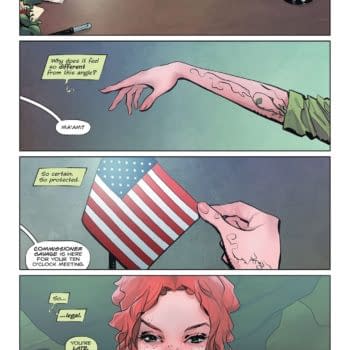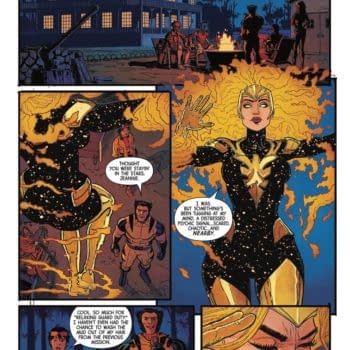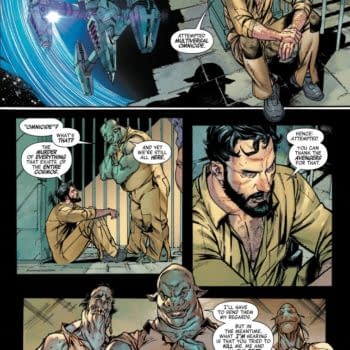Posted in: Comics, Recent Updates | Tagged: Comics, entertainment
In Defence Of… Secret Empire
So I like politics in my storytelling. How can there not be, I ask, when Jack and Jill went up the hill to fetch a pail of water, I am concerned about their gender roles in dividing up that labour, querying about the state of local public transport and why kids can't get the bus for free and getting worried about the level of lead in the water at the bottom of that well.
The comics I first loved were Steve Bell's If… and Gary Trudeau's Doonesbury in the Guardian. My favourite fiction was basically all the same thing, fantastical allegories of then-modern lives and politics, namely Gulliver's Travels, Pilgrim's Progress and The Hitch-Hiker's Guide To The Galaxy. And you know I was all over the film Brazil and the later Discworld books when the Guards turn up.
And while I gravitated towards superhero comic books, the best were written by Alan Moore, with Captain Britain, Marvelman and V For Vendetta being very political indeed – but in no way being simplistic about those politics. Everyone had an understandable point of view, there was a lot of equivocation and rationalisation and questions being asked, and chewed over, mostly from and to a lot of white men and children. If there was even a difference. 2000AD was pretty good too.
Viz Comic was also a natural progression as a young man, for all it's scabrous and scatological approaches, can wield one of the sharpest of satirical scalpels. And that brought me to Private Eye, possibly the greatest influence on my current job, and back to The Guardian and the work of Posy Simmonds, something I'd once dismissed as boring and now revealed for the light she shone on the person I was slowly becoming.
Still liked the superheroes. But the one I really liked were those that had satire embedded in their hearts in all manner of ways. Dark Knight, Watchmen, Marshall Law, Crisis, Revolver, Maximortal, Cerebus's Roach, The Authority, The Ultimates (first time around) Civil War – I didn't always agree with the points that were made, but I enjoyed the way they were being made.
The X-Men was pretty fine around then as well. I recall using lines lifted from Claremont's run when arguing in the classrooms against homophobia and for gay marriage in the mid-eighties. Two takeouts from that, first I was a really annoyingly earnest social justice warrior aged 14 (got kicked out of school assembly objecting loudly to an army recruitment drive) and secondly, the guy who I argued most about the gay issue with, now has a lovely husband.
Of course, this is from a position of safety. White, lower middle class, straight, cis and in an ex-mining town in the north of England. I argued the cases but much of it didn't seem to affect me that directly. The divide in my family was Working vs Middle, North Vs South, Christianity Vs Atheism, Tory Vs Labour. It felt a melting pot but it was anything but.
So arguing the toss, debating for debate's sake, playing devil's advocate, taking the opposing person's position and saying anything, however outrageous, for the purpose of it being debated was all the rage. That was the way things were meant to be, sticks and stones could break bones but words could never hurt me. Voltaire Uber Alles. Free Speech, Speaker's Corner, First Amendment Envy, the lot. Ideas could be explored, ideas you didn't hold, to see if they held weight. The very idea of a safe space was an anathema – that we were aware of, anyway.
And much of the last – let's say twenty years – has been coming to terms with the fact that other people react differently. Think differently. And that tolerance of people's opinions, those that you disagree with as much as you agree, is a very different thing if those ideas are aimed directly at your right to exist. Turns out that words can hurt you. It seems not everyone thinks like me, thinks that stories are just stories, is happy to wait to play them out, or happy to just not read something if they don't like where it's going, or can view it dispassionately, looking for form, technique or storytelling worth amongst, say, Frank Miller's Holy Terror.
Yes, I have that privilege.
And, yes, it was hard to get my head around the absolute outrage that followed the news that Captain America would feature a storyline in which he was revealed as Hydra, a fictitious group that had been allied with the Nazis during World War II. To be frank, he's always looked a bit fascist wrapped in the flag. And he's a superhero after all, the very nature of which is often criticised for their fascist overtones. Yes, he was created by Jewish creators as a direct riposte against Hitler – but that's partially why I found the story intriguing.
And when it was suggested that Magneto had joined Hydra, that made sense to me, Magneto was a figure of contradiction, a survivor of the Holocaust who yet took acts of genocide against humans, repeatedly, on the comic page and the big screen. At one point, he marched humans into crematoria. He seemed the summation of a common critique – itself criticised – that the abused become abusers, that Israel do to Palestinians what was once done to the Jews. Magneto joining Hydra – especially a Hydra that had divorced itself of Nazi ties and had disposed of the Red Skull – seemed aligned with the character's past fascistic actions, as portrayed in other Marvel comics.
It wasn't so much defending those points of view but exploring them. Like I was, back in the sixth form common room. In what was, in retrospect, the biggest safe space of all.
Marvel have tried their best to manage fan response to the ideas that have been expressed, but have done a rather poor job, to be frank. The equivocation that Hydra are not Nazis belies the fact that we've had plenty of Hydra-as-Nazis in the comics, the Hail Hydra is as close to Heil Hitler as you can get and the films and the TV shows, that Secret Empire employs imagery redolent from the Third Reich, and upcoming issues even have a Hydra Youth.
In Secret Empire, we seem to have a story about the corruption of power. How powers granted in times of emergency when they seem perfectly justifiable, are kept during peacetime and handed on to someone less suitable to wield them. How fascism and fascist thinking can be attractive, addictive, can creep in through the same systems intended to keep it out. And suddenly someone is in power and it's too late. Indeed, once they are in power, their support in the country can increase. That's very much the story of Hitler but some would also see it as the story of now.
Then we have resistance to that. How to deal with such a force when elected. The power and importance of resistance even when it has no discernible effect. The Man In The High Castle or SS: GB but, you know, with superheroes. And one's we'd heard of, rather than Uber.
It seemed rather apt. Certainly, that was criticism aimed at Donald Trump. And it might have gone over a whole lot differently when it was more conceptual when it was expected that Hillary Clinton would be President of The USA. Or at least contain a critique of her hawk-like nature without being so on-the-nose. Bullets dodged, etc.
The comic we appear to be getting is a full superhero cast reinvention of V For Vendetta with Captain America as Adam Susan and everyone else as V. And, just as V For Vendetta did with Susan, Captain America has a watertight and moral justification in his own mind, for what he is doing. Steve Rogers' actions are for the greater good, selfless and… worthy. Yet somehow, despite all his meticulous planning, heading for a fall.
However, given the concerns that had been expressed about these aspects, and some seriously flawed responses from Marvel folk, the promotional marketing for the series has hit quite the road bump. Just at the TV show Agents Of SHIELD has repeatedly shown Hydra imagery taking over SHIELD imagery, so the comic side have gone for a little synergy. And comic stores and comic book websites will be taken over by Hydra imagery – a look that is taken by some as synonymous with Nazism. It's one thing to read about Nazis, it's another to buy that comic from a Nazi shop, or find out about if on Comic Book Reichstags. Maybe going with Resistance-themed imagery might have diffused rather than exacerbated that impression.
Yes, more of that. Because A I don't think telling fans to be patient is going to cut it.
So the outrage continues to roll. Naturally, along the way there are contradictions such as it being fine to take Marvel chairman and Israeli war veteran Ike Perlmutter and conflate him with Hydra…
And then criticise Marvel for doing similar with Magneto.
But this is another example of people being… passionate. So I look forward to reading the new Secret Empire, chewing over the ideas within, enjoying the visceral thrill, comparing it to the current state of affairs, and looking for inspiration for a way through.
But for those who hate the very concept, throw despair and dismay, well that's just another way of expressing the same passion that I have. If I'm all about tolerance about people who think differently to how I do, the last thing I want to be doing is explaining how they got it all wrong.
Unless that's what I've just done.
Secret Empire #1 by Nick Spencer and Steve McNiven is published tomorrow. Secret Empire Free Comic Book Day by Nick Spencer and Andrea Sorrentino is published on Saturday.


















